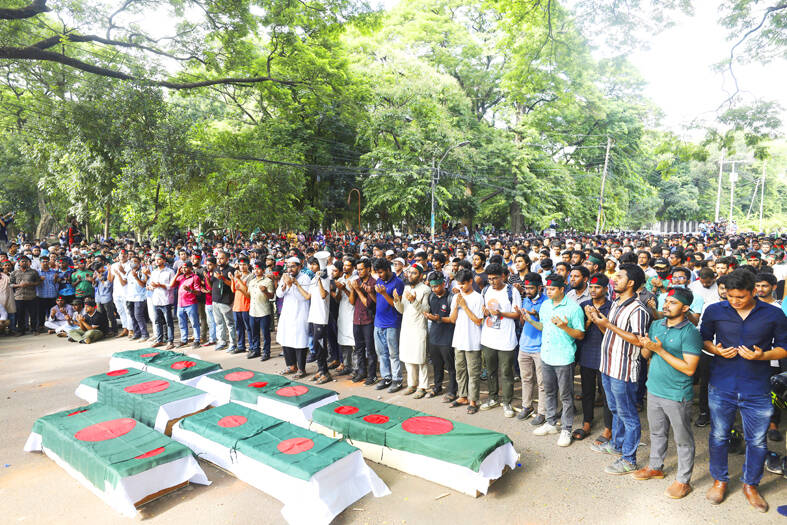Authorities in Bangladesh yesterday urged all universities to close, the day after at least six people died in violent protests over the allocation of government jobs.
Dhaka University, at the center of the violence, suspended classes and closed its dormitories indefinitely, a university official told reporters on condition of anonymity, as he was not authorized to speak to media.
The Bangladeshi University Grants Commission asked all public and private universities to close until further notice to protect students, but the request did not have legal force and it was not immediately clear how many universities would comply.

Photo: AP
Authorities said that at least six people were killed on Tuesday in violence across the country as student protesters clashed with other students and police.
Violence was reported across the capital, Dhaka, as well as in Chattogram and Rangpur.
The protests began late last month, demanding an end to a quota that reserves 30 percent of government jobs for relatives of veterans of Bangladesh’s 1971 war of independence.
Overnight, Dhaka police raided the headquarters of the opposition Bangladesh Nationalist Party (BNP), accusing it of playing a role in the violence.
Detective chief Harun-or-Rashid told reporters that police had arrested seven members of the party’s student wing in connection with two buses that were set on fire on Tuesday.
Detectives found 100 crude bombs, 500 wooden and bamboo sticks, and five to six bottles of gasoline in the raid, he said.
Ruhul Kabir Rizvi, a senior BNP leader, accused the government of “staging” the raid to divert attention from protests.
Police yesterday clashed with BNP supporters in Dhaka’s Paltan area after a funeral ritual for the six people who died on Tuesday.
Police official Sentu Mia said they used rubber bullets to disperse people after they attacked police, with several protesters arrested.
BNP secretary-general Mirza Fakhrul Islam Alamgir accused police of barring its supporters from the funeral prayers.
A senior leader of the ruling Awami League Party said that the opposition was using the protests as a weapon against Bangladeshi Prime Minister Sheikh Hasina.
Protesters should be patient until the Bangladeshi Supreme Court hears petitions involving the quota issues next month, an Awami League official said.

The CIA has a message for Chinese government officials worried about their place in Chinese President Xi Jinping’s (習近平) government: Come work with us. The agency released two Mandarin-language videos on social media on Thursday inviting disgruntled officials to contact the CIA. The recruitment videos posted on YouTube and X racked up more than 5 million views combined in their first day. The outreach comes as CIA Director John Ratcliffe has vowed to boost the agency’s use of intelligence from human sources and its focus on China, which has recently targeted US officials with its own espionage operations. The videos are “aimed at

STEADFAST FRIEND: The bills encourage increased Taiwan-US engagement and address China’s distortion of UN Resolution 2758 to isolate Taiwan internationally The Presidential Office yesterday thanked the US House of Representatives for unanimously passing two Taiwan-related bills highlighting its solid support for Taiwan’s democracy and global participation, and for deepening bilateral relations. One of the bills, the Taiwan Assurance Implementation Act, requires the US Department of State to periodically review its guidelines for engagement with Taiwan, and report to the US Congress on the guidelines and plans to lift self-imposed limitations on US-Taiwan engagement. The other bill is the Taiwan International Solidarity Act, which clarifies that UN Resolution 2758 does not address the issue of the representation of Taiwan or its people in

US Indo-Pacific Commander Admiral Samuel Paparo on Friday expressed concern over the rate at which China is diversifying its military exercises, the Financial Times (FT) reported on Saturday. “The rates of change on the depth and breadth of their exercises is the one non-linear effect that I’ve seen in the last year that wakes me up at night or keeps me up at night,” Paparo was quoted by FT as saying while attending the annual Sedona Forum at the McCain Institute in Arizona. Paparo also expressed concern over the speed with which China was expanding its military. While the US

SHIFT: Taiwan’s better-than-expected first-quarter GDP and signs of weakness in the US have driven global capital back to emerging markets, the central bank head said The central bank yesterday blamed market speculation for the steep rise in the local currency, and urged exporters and financial institutions to stay calm and stop panic sell-offs to avoid hurting their own profitability. The nation’s top monetary policymaker said that it would step in, if necessary, to maintain order and stability in the foreign exchange market. The remarks came as the NT dollar yesterday closed up NT$0.919 to NT$30.145 against the US dollar in Taipei trading, after rising as high as NT$29.59 in intraday trading. The local currency has surged 5.85 percent against the greenback over the past two sessions, central